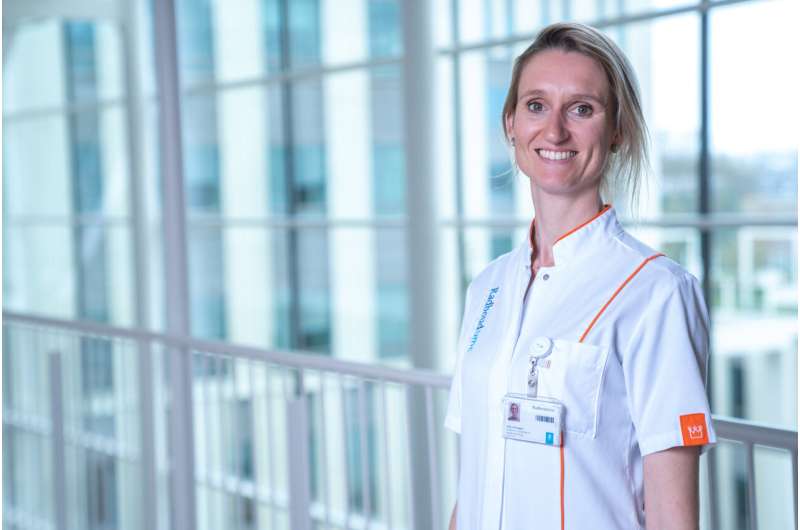This article has been reviewed according to Science X's editorial process and policies. Editors have highlighted the following attributes while ensuring the content's credibility:
fact-checked
peer-reviewed publication
trusted source
proofread
Saliva indicates severity of recurrent respiratory infections in children

A saliva test can more accurately indicate the severity of recurrent respiratory infections in children than the standard blood test. If saliva contains too few broadly protective antibodies, a child is more likely to suffer from pneumonia episodes. This is reported by researchers from Radboudumc Amalia Children's Hospital and UMC Utrecht Wilhelmina Children's Hospital in the European Respiratory Journal.
Saliva testing provides valuable information for treatment and is more comfortable for children. About 10–15% of all children suffer from recurrent respiratory infections. When they visit the hospital, blood is drawn to search for antibody deficiencies as an underlying condition. However, this rarely yields useful results.
"This is challenging for pediatricians because we really want to help the children," says pediatric infectious disease specialist/immunologist Lilly Verhagen of Radboud university medical center. "Therefore, we investigated whether we could find out more about the severity of the disease in another way. That would be very valuable in determining which children need more care and when it makes sense to give antibiotics."
Broad protection
A study involving one hundred children with recurrent respiratory infections shows that saliva measurements better indicate the severity of the disease than blood measurements.
"We found no relationship between antibodies in the blood and disease burden. But in saliva, we observed broadly protective antibodies that work against a variety of pathogens. Children with lower levels of these antibodies had more severe infections. These antibodies in saliva are indeed a good indicator of disease burden," explains Ph.D. student Mischa Koenen.
The broadly protective antibodies are present in everyone's airways; researchers also found them in siblings and parents of the affected children and in healthy caregivers. A high level of these antibodies in saliva is beneficial against respiratory infections. They bind so broadly that researchers found antibodies in pre-pandemic children's saliva that could bind to the SARS-CoV-2 virus.
Bacteria
While highly present in saliva, the broadly protective antibodies are scarcely identified in the blood.
"And that's quite logical," says Verhagen. "You inhale various things all day, including many respiratory pathogens, and therefore need a broad spectrum of antibodies in your airways. It's different in the blood: Only a few pathogens enter the bloodstream through the mucosa of the intestines or airways. When that happens, your body benefits more from a strong, targeted immune response."
Besides antibodies, the researchers also examined the balance between healthy and potentially harmful bacteria on the mucous membranes of the airways, also called the microbiome. They found that a specific bacterium on the nasopharyngeal mucosa is strongly associated with the severity of respiratory infections. This bacterium, named Haemophilus influenzae, also colonizes healthy airways. However, children with a high abundance of this bacterium in their airway mucosa are more frequently ill in the winter. This bacterium has previously been linked to pneumonia episodes.
Future
Saliva and nasopharyngeal mucosal measurements are thus a tremendous aid in assessing children with recurrent respiratory infections.
Koenen states, "This helps us assess the amount of care and medication children need and which antibiotic to use, as the current standard does not work optimally against Haemophilus influenzae. I expect the initial blood test to remain, but for follow-up appointments, a more child-friendly saliva and nasopharyngeal swab could be used as indicators of expected respiratory disease burden."
Saliva testing also offers prospects for new treatments and therapies. The researchers found that the flu vaccine increases the amount of broadly protective antibodies in the saliva of healthy caregivers. Additionally, the team is looking into the long-term possibility of harnessing these antibodies for future treatment of respiratory infections.
More information: Salivary polyreactive antibodies and Haemophilus influenzae are associated with respiratory infection severity in young children with recurrent respiratory infections, European Respiratory Journal (2024).




















